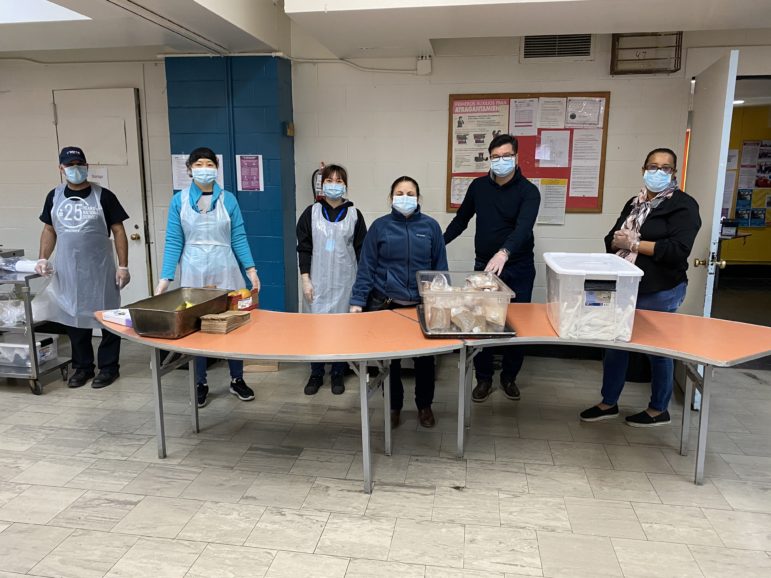
Grand Street Settlement
At work inside Grand Street Settlement.Nonprofits in New York and across America are in crisis. As the executive director of Grand St. Settlement, a venerable social services nonprofit agency in New York City founded in 1916, I’m fighting daily—in the uncharted territory of the coronavirus pandemic—and using every available tool to continue to provide high quality services to my community. Now more than ever, the people living in public housing who rely on our neighborhood community centers need access to early childhood education, youth programs, senior housing, as well as social services and economic development.
One of those tools is a stimulus loan available through the Small Business Administration Paycheck Protection Program (PPP) announced at the beginning of April. Grand Street worked hard to apply for and receive one of these loans. We were approved by the SBA through our community bank partner by April 7th and by April 17th we had loan funds wired into our bank account to cover eight weeks of payroll and limited overhead expenses, like rent and utilities for our community centers.
Grand Street is already using this loan to survive the onslaught of government funding cuts to services like youth after-school programs and early childhood services for pre-schoolers. And at the end of eight weeks, we will apply for loan forgiveness because we will avoid layoffs during this time period. That means that for two months over 400 frontline employees—who teach our children, care for our fragile seniors, and support the neediest families in New York City—will be able receive their regular paychecks and medical benefits as we provide crucial social services during the COVID-19 public health emergency.
 CityViews are readers’ opinions, not those of City Limits. Add your voice today!
CityViews are readers’ opinions, not those of City Limits. Add your voice today!
While it is still unclear how many nonprofits applied for and received the PPP forgivable loans, what is clear is that most nonprofits simply could not access these emergency relief loan funds. In a blog post, entitled “PPP Loans Nonprofit Nightmare Update – Monday, April 13, 2020” from InsideCharity, the launch of the SBA program was described as “chaotic” and they stated, “To date, we have NOT identified a single nonprofit who has received Paycheck Protection Program relief.” By April 16, the new loan initiative aimed at helping small businesses and nonprofits weather the economic fallout from the COVID-19 response had run out of money.
What made the difference for us? We applied through a Community Development Fund Institution (CDFI), Spring Bank. They’re New York’s first B Corp Bank founded in the South Bronx in 2007, which primarily serves low and moderate income communities. You might consider applying to a CDFI, especially if you have a relationship with them. In our case, we had already been working with Spring Bank in a partnership to extend credit builder loans to Grand Street employees who were underbanked, with limited credit history or savings. These types of community banks were the first to begin processing PPP loan applications and prioritized nonprofits and smaller businesses.
A second round of PPP funding launched on April 27th, but it may be too late for your nonprofit to access these funds unless you have already prepared your application with an established lender, especially one who understands nonprofit finances. For example, nonprofits file quarterly IRS Form 941s for payroll taxes, not the Form 940s that small businesses file. A community bank that specializes in nonprofit accounts will know this type of detail and ensure that the proper documents are submitted to the SBA, so your application is less likely to be kicked back and delayed. Definitely look for a bank that is an SBA preferred lender, as it will have significant experience in reviewing and approving SBA loans. Try to find a lender that you can have a relationship with, not a toll free number or a banker with limited experience in handling SBA loans. Finally, get your accurate SBA PPP loan in right away. The $310 billion in funding in the second PPP round is likely to go even faster than the first. Smaller institutions like credit unions and community banks have been allocated $60 billion for loans like ours.
The SBA PPP is a temporary salve to the pain that nonprofits are experiencing. Many charitable organizations are closing or considering doing so. When we emerge from this crisis, we will operate differently—with even more resources focused on basic essential services like food insecurity, housing instability and the need for employment to raise families out of poverty. Organizations like Grand Street will shrink significantly and fewer employees will do even more for our communities, but our work will be more important than ever. As nonprofits, we owe it to our communities to weather this crisis and continue to offer the life-changing services we do best.
CDFI’S IN NYC PROCESSING PPP LOANS
BOC Capital Corp
Brooklyn Cooperative FCU
Carver Federal Savings Bank
First American Bank
Grow America Fund, Incorporated
Lower East Side People’s FCU
Neighborhood Trust FCU
New York University FCU
Spring Bank
TruFund Financial Services Inc
Robert Cordero is the executive director of Grand St. Settlement








